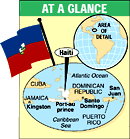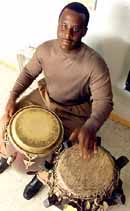| Want to send this page or a link to friend?
Click on mail at the top of this window. |
| Published in Newsday April 14, 2002 |
Every Saturday, Anacaona, a music, dance and drama group of about 25 Haitian-American
children and adults, meets at the home of Robert Boco's parents in Far Rockaway.
Robert's father, Jean, founded the group 16 years ago. It is named after a 15th century
singer who was the wife of a leader of the Tainos, one of two Indian tribes that
originally inhabited Haiti.
Robert and his family are part of one of the largest Caribbean groups to emigrate to
the United States. In 1990, according to figures from the Haitian Consulate, there were
450,000 Haitians living in New York's five boroughs, many of them in Brooklyn. Another
25,000 were living in Nassau and Suffolk counties. Statistics from the Immigration and
Naturalization Service show that about 181,000 Haitians emigrated to the United States
between 1989 and 2000 alone.
| In addition to Robert's Far Rockaway community,
Haitian-Americans in New York are concentrated in the Flatbush section of Brooklyn; in
Rosedale and Cambria Heights in Queens, and in Uniondale and Hempstead on Long Island.
Robert, a 17-year-old drummer and director of
Anacaona, was born in the United States and until last August had never visited Haiti. But
the teen has learned a lot about the world's first black republic at the Haitian history
sessions his father holds for the band members after rehearsals.
With
Jean Boco acting much like an African griot, an entertainment tribal storyteller, the
lectures offer glimpses of the history of the only nation created as a result of a
slave revolt.
|

|
| History, however, has not been kind to Haiti. Once among the
richest colonies in the Americas -- a source of coffee, sugar, bananas and cotton -- Haiti
today is listed by the U.S. government as one of the poorest nations in the Western
Hemisphere, with 80 percent of its residents living in poverty.
Haiti is a Carib Indian word meaning
"land of mountains." When Christopher Columbus found the island in 1492 on his
voyage to find India, he claimed it for Spain and and renamed it Hispaniola.
The Spanish
established control of the eastern side of the island, which is now the Dominican
Republic, but by 1697 Spain recognized French control of the western side, which now
Haiti.
Haiti
is a Carib Indian word meaning "land of mountains." When Christopher Columbus
found the island in 1492 on his voyage to find India, he claimed it for Spain and renamed
it Hispaniola.
The
Spanish established control of the eastern side of the island, which is now the Dominican
Republic, but by 1697 Spain recognized French control of the western side, which is now
Haiti. |

Robert Boco - His |
Family is from Haiti |
|
Early on, the French named their colony St. Domingue and imported slaves from Africa to
work on sugar and coffee plantations after the Arawak or Tainos, as the Indians called
themselves, were nearly wiped out by diseases from the Old World and brutal treatment at
the hands of Spanish and French colonizers.
Slave uprisings led to Haiti's independence from France in 1804 and the establishment
of a republic under its old Indian name, Haiti. After much turmoil, it came under the
direct rule of the U.S. military between 1915 and 1934, a period that helped return it to
stability. After World War II Francois Duvalier came to power. Known as Papa Doc, he ruled
as a dictator, using armed death squads called Tontons Macoute (bogeymen) to dominate the
Haitian people until his death in 1971. Power transferred to his son, Jean- Claude, and
Baby Doc ruled until 1986, when he fled a revolt. Military coups followed, finally leading
to democratic rule with the election in February 1991 of Jean-Bertrand Aristide, a former
Catholic priest. But Aristide was deposed by the military only months after his election.
The turmoil caused many Haitians to try to flee to the United States in small boats. In
1994, the United States sent troops to Haiti and successfully forced the Haitian military
to allow Aristide to return to office. In 2000, Aristide was again elected to the
presidency. Last summer vacation, Robert Boco experienced his roots firsthand with his
uncle, Jacques Boco, who took him on a two-week driving tour of Haiti in August. They
arrived in Port-au-Prince, Haiti's capital, and their itinerary included a trip to Haiti's
second largest city, Cap Haïtien, to see the Citadel. The 200- year-old fortress was
built 2,700 feet above the city by Henri Christophe, a slave who went on to become king of
Haiti, to ward off a new French invasion after independence. Christophe, Toussaint
L'Overture and Jean-Jacques Dessalines were heroes of Haiti's independence movement
against French Emperor Napoleon Bonaparte's army leaders.
Robert and his uncle blended in with the native Haitians, most of whom speak Creole, a
mixture of African dialect, French, English and Spanish. High on their itinerary was a
voodoo ceremony. Haitian culture blends French and Roman Catholic traditions with customs
the slaves brought from Africa. Voodoo, the religion reflecting this blend, is practiced
by more than half of the Haitian people.
With practical knowledge of his heritage, Robert believes he can better fulfill a
cherished dream, "to expose the Haitian culture to all nationalities."
Copyright © 2002, Newsday, Inc.
| Wehaitians.com, the scholarly journal of
democracy and human rights |


